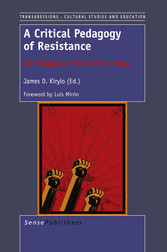Suchen und Finden
A Critical Pedagogy of Resistance - 34 Pedagogues We Need to Know
The diverse range of critical pedagogues presented in this book comes from a variety of backgrounds with respect to race, gender, and ethnicity, from various geographic places and eras, and from an array of complex political, historical, religious, theological, social, cultural, and educational circumstances which necessitated their leadership and resistance. How each pedagogue uniquely lives in that tension of dealing with pain and struggle, while concurrently fostering a pedagogy that is humanizing, is deeply influenced by their individual autobiographical lens of reality, the conceptual thought that enlightened them, the circumstances that surrounded them, and the conviction that drove them. To be sure, people of justice, people who resist, are framed by a vision that embraces an inclusive, tolerant, more loving community that passionately calls for a more democratic citizenship. That is just what the 34 critical pedagogues represented in this text heroically do. Through the highlighting of their lives and work, this book is not only an excellent resource to serve as a springboard to engage us in dialogue about pivotal issues and concerns related to justice, equality, and opportunity, but also to prompt us to further explore deeper into the lives and thought of some extraordinary people. A Critical Pedagogy of Resistance: 34 Pedagogues We Need to Know is an ambitious undertaking. Kirylo's narrative enterprise, which seeks to chronicle the lives of transformative pedagogues, is a project whose time has come. This text is an excellent resource for all those interested in the aesthetic that, as Kierkegaard believed, exercised power for the common good. Luis Mirón
Alle Preise verstehen sich inklusive der gesetzlichen MwSt.








